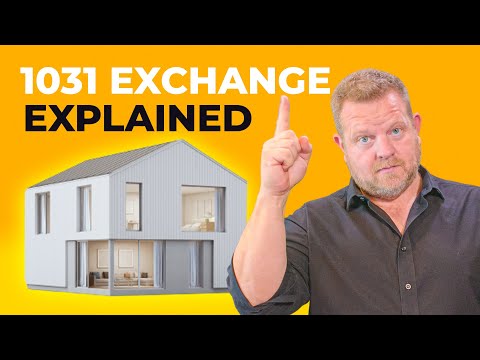What Is 1031 Exchange: A Deep Dive Into Real Estate’s Tax Alchemy
Understanding the intricacies of real estate investments can feel like grappling with a complex code. And right there, in the mix, is one pearl of wisdom that savvy investors love to crack: what is a 1031 exchange?

The Genesis of 1031 Exchanges: Tracing Back to Section 1031
So, where did this treasure of tax deferment called a 1031 exchange hail from? It’s an economic charm that dates back to 1921, though it didn’t get the 1031 moniker until a bit later. Over the years, Section 1031 of the IRS code has undergone various transformations, with the most recent updates adding finer layers of complexity to this investment puzzle.
By 2024, Sectio`n 1031 has cemented its reputation as a cornerstone for real estate moguls. If those walls could talk, oh, the tales they’d tell of the rags-to-riches stories they’ve been an integral part of, folks.

| Aspect | Detail |
|---|---|
| Definition | A 1031 exchange, also known as a like-kind exchange, is a swap of one investment property for another that defers capital gains taxes. |
| Eligibility for Properties | Must be investment or business properties. Personal properties don’t qualify. |
| Primary Benefit | Deferral of capital gains and depreciation recapture taxes upon the sale of a property by reinvesting proceeds into a like-kind property. |
| Types of 1031 Exchange | Simultaneous, Delayed, Reverse, and Improvement/Construction 1031 Exchanges. |
| Timeline Constraints | Identification Period: 45 days from the sale of the original property to identify potential replacement properties. Exchange Period: 180 days from the sale or until the tax return due date (whichever is earlier) to complete the exchange. |
| Estate Planning Consideration | Heirs may benefit from a step-up in basis upon the death of the investor, potentially eliminating the deferred taxes. |
| Minimum Hold Requirement | Generally no specific time, but the property should be held for productive use in trade or business or for investment. For a related party exchange: 2 years minimum hold required. |
| Like-kind Requirement | Properties must be of ‘like-kind’—similar in nature or character, irrespective of grade or quality. |
| Potential Pitfall | Any misstep or failure to comply with the 1031 exchange rules, such as not meeting deadlines, can lead to the disqualification of the exchange and immediate tax liabilities. |
1031 Exchange Rules: Navigating the Tax Labyrinth with Expert Precision
If you wanna get serious about a 1031 swap, then honey, you need to know the rules like the back of your hand. As of 2024, the 1031 exchange rules have a few nifty surprises but sticking to them is key.
The rule of the game stays the same – the properties involved must be of ‘like-kind,’ a term that is broader than one might expect. Plus, this isn’t a free-for-all; both the property sold and acquired should be for investment or business use.
Now let’s talk timing because timelines and identification periods are the ticking bombs that could dismantle the deal. After closing the sale, you’ve got 45 days to identify a potential replacement property. Miss this, and you can kiss that tax deferment goodbye. And, you have a total of 180 days to close that deal. Tick-tock!

How Does a 1031 Exchange Work: The Inner Workings of a Like-Kind Exchange
Alright, let’s walk through this step-by-step ’cause how does a 1031 exchange work is what’s on everyone’s lips. Imagine you’re the owner of a quaint apartment building who’s eyeing that swanky office complex. You sell the apartments, hold your breath, and use a Qualified Intermediary (a must-have middleman) to snag the office building. Voila! No capital gains tax, for now.
Case studies shine a light on savvy investors who’ve nailed this process. Take the Johnsons, who turned a modest commercial space into a thriving retail hub without handing a dollar over to Uncle Sam in taxes initially.

The Astounding Impact of 1031 Tax-Deferred Exchanges on Investment Portfolios
Now, to the nitty-gritty of why 1031 tax deferred exchange is the golden goose. It’s simple – reinvesting the entire gain from the sale means more capital to compound and grow. The difference is stark when you compare the growth of portfolios using 1031 exchanges versus those that take the tax hit upfront.
Investors have sung praises of how 1031 exchanges have not just buffered their wallets but transformed their investment approaches. Growth, expansion, diversification – it’s like steroids for your portfolio, legally!

5 Mind-Blowing Facts about 1031 Exchanges You Probably Didn’t Know
Playing by the Rules for 1031 Exchange: Staying within Legal Boundaries
Now, let’s talk consequences. Stray from the rules for 1031 exchange, and you’re in for a world of hurt. The taxman cometh, and he’s not playing games. Rule violations can lead to the entire exchange being disqualified, triggering capital gains and depreciation capture taxes that could make your eyes water. So, stay punctilious and follow the guidelines.
The Future of 1031 Swaps: Predicting the Evolution of Like-Kind Exchanges
Fasten your seatbelts ’cause the 1031 train isn’t slowing down. Looking ahead, we can expect further refinements to the process. Industry leaders speak of increased transparency, streamlined regulations, and maybe even more favorable conditions for investors.
Conclusion: Embracing the Potential and Avoiding the Pitfalls of 1031 Exchanges
So, there you have it – the crispy crust and the gooey cheese of 1031 exchanges. Understanding and leveraging like-kind exchanges could rocket your investment portfolio to new heights. But remember, knowledge is power, and in the land of 1031, it’s the magic wand that turns a good deal into a great one.
Stay diligent, consult with the gurus, and you could be looking back at your real estate dances with nothing but smiles. The future is bright, the opportunities plenty, and with the right moves, you shall thrive in the real estate galaxy!
What Is 1031 Exchange? Dive Into These 5 Mind-Blowing Facts
When it comes to real estate and taxes, you might think you’ve heard it all. But hold onto your hats, because we’re about to jump into the exciting world of the 1031 exchange—a fancy tax-deferral dance that could have you twirling with joy. And let me tell you, understanding this concept is a smoother move than learning the latest Twerk meaning. So, let’s break it down with some fun trivia that’ll make you go “Just like that?! à la Bonnie Raitt.
The Time-Travelling Profit Trick
Ever wish you could dodge taxes like you dodge those awkward family gatherings? Well, with a 1031 exchange, it’s kind of like you can. Normally, when you sell a property, Uncle Sam’s like, “That’s nice, now give me a slice,” and you’re hit with a capital Gains tax on house sale that could crunch your wallet. But with a 1031 exchange, you can tell those capital gains to take a rain check. Just swap your investment property for another “like-kind” property, and voilà! You’ve postponed paying tax, maybe indefinitely. It’s like a financial game of freeze tag, and you’re “it” forever—unless you cash out, that is.
The Celebrity Secret Hideaway
Okay, get this. You might not find this splashed across the tabloids next to headlines about Tom Cruise’s daughter, Suri, but celebs and savvy investors are all over 1031 exchanges. They’re not just buying and selling props for their next blockbuster—oh no—they’re swapping properties behind the scenes to keep those pesky taxes at bay. It’s how they keep their fortunes as well-scripted as their screenplays.
The Magic Number: No, Not Your Birthday
Now don’t go thinking you can just do this exchange thing willy-nilly. There’s a magic number: you’ve got 45 days to identify your potential new property once you sell the old one. Miss this window and poof! The tax benefit disappears faster than a celebrity scandal. And once you’ve picked your new investment charm, you have a total of 180 days to seal the deal. Talk about a ticking clock!
The Whole Shebang: Not Just For the Donald Trumps of the World
Speaking of celebrity wheelers and dealers, guess who’s probably high-fiving over their 1031 exchanges? People like Patti Davis, who know that when it comes to investments, it pays to be smart. This tax-escapade isn’t just for the high-flyers in their top-dollar suits; even the smaller investors can play the game. Whether it’s a duplex down the street or an artistic installation that’s technically real estate, if it’s for business or investment, you might be in the club.
The Big “If” – Short-Term vs. Long-Term
Alright, now here’s a kicker. You’ve got to be aware of the type of gains you’re wrangling. If you’re in the business of flipping houses faster than a short-order cook flips pancakes, you might just be dealing with short term Gains tax instead of long-term capital gains. And folks, that’s a whole different rodeo with different rules. Make sure your gains are ripe and matured, or you’re not playing in the 1031 exchange sandbox.
In the whirlwind world of real estate shuffles, a 1031 exchange is your secret handshake into the club of tax deferment. It’s not child’s play, but it’s a power move that can save you big bucks when you’re in it for the long haul. Just remember, this isn’t about dodging the tax bullet forever—more like delaying it until the timing suits you better than a tailored suit at the Oscars. And who knows? Maybe you’ll need that extra cash to figure out your alimony responsibilities with an alimony calculator Florida style, or invest in a hip new business venture.
Either way, whether you’re selling your starter home or your mansion, armed with these facts about the 1031 exchange, you’ll be navigating the real estate market with the finesse of a seasoned pro. So, take these tidbits, tuck them under your belt, and maybe, just maybe, you’ll find yourself with a little extra jingle in your pocket. Because when it comes to taxes, my friend, knowledge truly is the most valuable currency.

What is a 1031 exchange and how does it work?
– A 1031 exchange, huh? Well, picture this: It’s like a financial game of hot potato with properties, where you sell one investment property and, instead of pocketing the dough, you use it to buy another like-kind property. Voilà! By doing this within the IRS’s strict timeframes, you sidestep capital gains taxes… for now, at least.
What is the downside of a 1031 exchange?
– Ah, the catch with a 1031 exchange? Sure, it’s nifty for dodging taxes on the fly, but there’s a rub: it’s not a tax-freebie, but a tax-deferment game. Plus, it can tie your hands with complex rules and potentially loom over your estate. And, well, if the market’s sour when you’re on the clock, good luck finding that golden property.
How long do you have to hold a 1031 exchange property?
– Hang tight to that 1031 exchange property, will ya? The IRS isn’t playing around here. There’s no hard and fast rule, but the general vibe is that you should treat it like a long haul investment. To avoid side-eye from the IRS, two years is a good bench marker so they don’t suspect you’re flipping properties like pancakes.
Is a 1031 exchange bad for a buyer?
– Not necessarily, y’know? A 1031 exchange can be pretty neutral for buyers. Sure, the seller is hopping around trying to escape taxes, but for the buyer, it’s usually business as usual. Unless, of course, the 1031 twists your arm into a quick closing or accepting some quirky property terms.
Can you live in a 1031 exchange property after 2 years?
– Living in a property after pulling a 1031 exchange? Steer clear for a couple of years, buddy. The IRS wants investment vibes, not your home sweet home feels. But hey, after two years, you might get a shot at turning it into your nest – if you play by the rules, that is.
What is the 2 year rule for 1031 exchanges?
– The 2-year rule for 1031 exchanges is like a probation period – don’t even think about moving into that property or changing its use before then. The IRS expects you to have ‘intent to invest,’ and having the property as a rental for at least two tax years helps prove that point.
Is it better to do a 1031 exchange or pay the taxes?
– It’s the million-dollar question: 1031 exchange or coughing up for taxes? Well, deferring taxes through a 1031 can give your wallet a breather, boosting your investing power in the now. But it ain’t all sunshine – you’re just kicking the tax can down the road. Crunch the numbers and consider your long game.
What is better than a 1031 exchange?
– Better than a 1031 exchange, you wonder? It’s a bit like comparing apples to oranges, but for some, Opportunity Zones might hit the sweet spot. In the right circumstances, they can offer more flexibility and, if you hang onto the investment long enough, potentially forgive some capital gains completely.
Can you ever live in a 1031 exchange property?
– Once you’ve got a 1031 exchange property, turning it into your personal palace isn’t the plan. But life’s a winding road, and if after a few years your investment property starts looking homey, there could be ways to settle in. Just tread carefully – the IRS is peeking over your shoulder, after all.
Why would you do a 1031 exchange?
– Dive into a 1031 exchange and you’re essentially playing tag with taxes – “Not it!” You swap one property for another, deferring capital gains taxes, and that’s a pretty sweet deal if you’re looking to expand or switch up your property portfolio without the taxman snagging a piece of the pie.
Can you gift a 1031 exchange property to a family member?
– Gifting a 1031 exchange property to family? That’s one generous move, but wait a tick! Doing this too soon after the exchange might trigger unwanted attention, as the IRS has a keen eye for anything that looks like you’re trying to sidestep the rules. If you can hold off for a bit before playing Santa, it might just save you a headache.
Can you use a 1031 exchange to purchase a second home?
– Dreaming of a 1031 exchange to snag that second home? Keep dreaming unless it’s for rental or investment purposes. The IRS won’t throw you a bone here; they’re looking for like-kind exchanges that smell of business, not beachside barbecues and family retreats.
How do I avoid capital gains when selling my house?
– Skirt around capital gains when selling your castle? Sure! Your best bet is rolling out the welcome mat to IRS exclusions, like living in your home for two of the last five years, which could let you exclude up to $250,000 of the gain if you’re single, and double that if you’re hitched!
Who benefits from a 1031 exchange?
– A 1031 exchange is like a golden ticket for property investors looking to swap their assets without the tax bite. By bouncing from one investment to the next, they can potentially snowball their portfolio without Uncle Sam dipping into their gains – at least until the final curtain call.
Why would an investor benefit from a 1031 exchange?
– Investors get jazzed about 1031 exchanges because they’re like passing “Go” in Monopoly and collecting $200, except it’s avoiding capital gains taxes. This savvy move means more dough stays in their pockets to reinvest, giving ’em a juiced-up buying power to snag bigger or better properties.
Why would you do a 1031 exchange?
– Opting for a 1031 exchange is a strategic chess move in the property game. It lets you defer those irksome capital gains taxes, giving you a leg up to reel in another property. It’s all about leveraging your investment to grow your portfolio while keeping the taxman at bay – for the moment, anyway.
Can you build a house with a 1031 exchange?
– Constructing a new stronghold with a 1031 exchange isn’t for the faint of heart. It’s like hopping on a tightrope without a net! If you got the balance, you can do it, but you’re up against the clock and a tangle of IRS red tape. Make sure you’ve got the blueprints ready and a grip on the rules before you leap.
Can you buy a second home with a 1031 exchange?
– A second home with a 1031 exchange isn’t as easy as pie, pal. This ain’t your summertime lake house or your ski-in, ski-out chalet. The IRS is peeking through their looking glass for proper investment or business properties, not a personal holiday spot. Go by the book, or your tax-saving plans could hit the skids.



